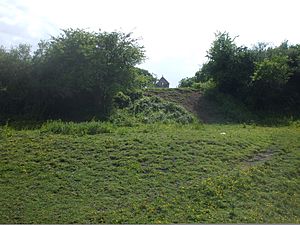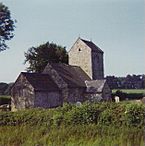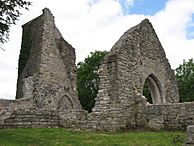Caerau Hillfort facts for kids
Caerau Hillfort (Welsh: Bryngaer Caerau) is a massive ancient fort located in the western part of Cardiff, Wales. It's built on a high ridge, making it a strong defensive spot. This hillfort is one of the biggest Iron Age sites in south Wales and even in all of Great Britain.
Before the Iron Age people built their fort, the site was used by people during the Neolithic period, which was much, much older! Inside the hillfort, you can also find an old church, St Mary's, and a small castle-like structure called a ringwork.
Contents
Caerau Hillfort: An Ancient Stronghold
Caerau Hillfort covers about 5.1 hectares (that's over 12 acres!). It's surrounded by modern houses and a main road, the A4232. Long ago, this fort was a key stronghold for the powerful Silures tribe. They were a group of people who lived in this part of Wales before the Romans arrived.
Discoveries at the Hillfort
Archaeologists have learned a lot about Caerau Hillfort from digging there. In 2012, the TV show Time Team explored the site. Their findings showed that people lived here as far back as 2,550 years ago.
More digs in 2013 and 2014 found even older evidence. They discovered flint tools and weapons from the early Neolithic period, dating back about 5,550 years! This means people were using this spot for a very long time. They also found pottery from the Iron Age and the Roman period. One special find was a piece of a Roman pouring vessel from the 1st century AD.
How the Fort was Built
The hillfort was designed to be very strong. The steep northern and southern sides of the ridge have three huge earth walls, called ramparts, with ditches in front of them. These are now hidden by trees. On the eastern side, there are fewer ramparts, only one or two.
The fort likely had two main entrances. One was on the eastern side, where the ramparts curved to protect the approach. The other was near the southern corner. There might have been a third entrance in the northwest, but it's been worn away by water from a spring.
Inside the fort, the land is now used for grazing animals. But in the past, it was farmed. You can still see traces of old farming patterns, like "rig and furrow," from aerial photos. There are also two old earthworks crossing the interior. These might have been old field boundaries, or perhaps even parts of an earlier, smaller fort, or a very old Neolithic enclosure.
The Old Church and Castle
Inside the hillfort, you'll find the ruins of St Mary's church. It probably dates back to the 13th century. Today, it's mostly stone walls, but it once had a main hall (nave), a porch, a vestry, and a tower.
The church has been restored a few times over the years. It was repaired around 1885 and again in 1961. However, it later fell into disrepair and is now mostly in ruins.
The Ringwork Castle
To the northeast of St Mary's church, there's an oval-shaped medieval ringwork. It measures about 35 meters by 20 meters. A ringwork is a type of small castle or fortified enclosure, usually made of an earth bank and ditch.
This ringwork has its own rampart and ditch, with an entrance facing the church. It's thought that this might be an unrecorded castle. It could have belonged to the Bishops of Llandaff and was likely built around the same time as the church.
 | Percy Lavon Julian |
 | Katherine Johnson |
 | George Washington Carver |
 | Annie Easley |




